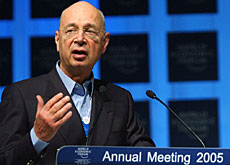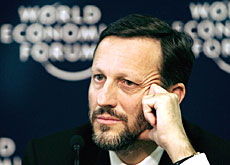WEF ends with calls for more political will

The World Economic Forum (WEF) has ended its annual meeting with calls for action to tackle poverty, education and climate change.
However, global business leaders said concrete actions in these fields were the responsibility of their political counterparts.
Sunday’s closing session brought together leading lights of the global political and business community to summarise the main findings of the five-day congress.
Ged Davis, managing director of the WEF centre for strategic insight, began the session by highlighting five specific issues identified by participants as requiring action in 2005: poverty, “equitable” globalisation, climate change, education and global governance.
Specific proposals included creating a fund to accelerate financial aid to the poorest nations, removal of trade barriers that deprive developing countries of the benefits of economic growth and adopting technology to reduce emissions of greenhouse gases.
The choice of issues largely reflected the tone of this year’s meeting, which, while including many sessions on specific economic and business issues, was dominated by the themes of development aid to Africa and ways to alleviate poverty in general.
Too much talk?
Daniel Vasella, CEO and chairman of Swiss pharma multinational, Novartis, said the gulf between the political and business worlds was not so great.
“It seems that many of the non-governmental organisation agenda points have somehow been integrated into the speeches of politicians and the attitudes of business people,” he said.
However, Vasella warned against spending too much time on discussions.
“We should always think about humanistic aspects in the way we conduct business but we do not always have to talk about this. By talking too much, we can be very counter-productive,” stressed Vasella.
Australian Prime Minister John Howard said poverty was unarguably “the world’s biggest problem, in both moral and political terms” and partly laid the blame on countries with protectionist agriculture policies.
“It is the restrictive access policies of the developed nations, particularly on agriculture, that are locking out developing countries from the world trade system,” said Howard.
Last year, the World Trade Organization criticised Switzerland for bestowing some of the highest subsidies in the world on its farmers.
Stone’s throw
Kumi Naidoo, head of South African non-governmental organisation, Civicus, welcomed the meeting’s focus on the issue of poverty and acknowledged the “genuine compassion” of participants.
However, he also highlighted what he saw as the main “gaps” in the discussion – namely the issues of gender inequality, unsustainable “over-consumption”, the “democratic deficit” of key global institutions, and lack of “political will”.
One participant highlighted the example set by actress Sharon Stone on Friday, who interrupted a workshop on aid to Africa by making a personal pledge of $10, 000 – and managed to raise a total of $1 million before the end of the session.
WEF founder and executive chairman Klaus Schwab concluded by urging participants to exercise “self responsibility, global responsibility – the tsunami aid showed that we are capable of this – and responsibility to the next generation”, which would “improve the state of the world.”
swissinfo, Chris Lewis in Davos
The annual meeting attracted 2,346 participants, many of them household names from politics, business and showbusiness.
Issues covered ranged from the state of the global economy to development aid.
While social issues topped the agenda, a common theme was the need for complementary economic and political solutions to key challenges.

In compliance with the JTI standards
More: SWI swissinfo.ch certified by the Journalism Trust Initiative










You can find an overview of ongoing debates with our journalists here . Please join us!
If you want to start a conversation about a topic raised in this article or want to report factual errors, email us at english@swissinfo.ch.